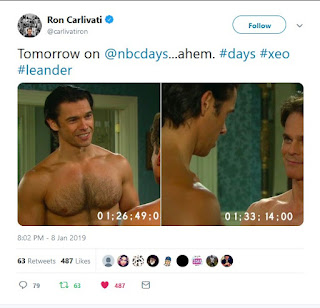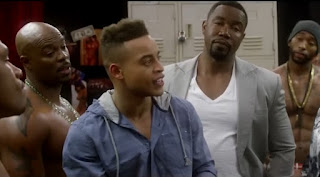VOD Review - The Circle (Der Kreis)
This film is about Ernst Ostertag and Röbi Rapp who became the first same-sex couple to get married in Switzerland. It particularly focuses on the couple's lives in the 1950's and early 60's when the two were members of an organization called The Circle, which had its own bar for gay people, as well as a magazine that featured gay literature and gay artwork.
It won the Teddy Award for Best Documentary at the 2014 Berlin Film Festival. It also won Best Documentary Feature at the 2014 L.A. Outfest. It was the Swiss submission for Best Foreign Language Film at the 87th Academy Awards. It didn't get the nomination, but the movie won four Swiss Film Awards, which is the Alpine country's version of the Oscars.
There's an interesting contradiction there. A major film festival calls the movie a documentary. Yet, the Swiss Film Awards gave the movie trophies for acting and its screenplay, suggesting that it's a drama. The contradiction isn't such that's confusing within. This film is both a documentary and it's a drama in equal measure. We see the real Ostertag and Rapp as well as actors playing the same-sex couple in absolute balance.
One of my favorite films or cinematic biographies that blend real people along side actors playing those same real people is American Splendor (2003). That film put real person Harvey Pekar along side actor Paul Giametti who plays Pekar as he develops his comic books, but Giametti was more the center of that film, whereas the actors here are less so. Basically, one could sum it up by saying this movie is a documentary with very extensive re-creations. It's the logical progression of the tradition started by Errol Morris in The Thin Blue Line (1988).
Tom Roston in October 7, 2013, wrote a blog titled "Establishing the Hybrid Documentary Canon" for his column Doc Soup for PBS.org. The blog defines and enumerates films that are both documentaries and dramatizations at once and in equal measure. He noted a significant number of such films that were released that year, including The Act of Killing, Stories We Tell, The Missing Picture and No (2012). Other notable films in this vein are The Imposter, Exit Through the Gift Shop, Waltz With Bashir and The Kid Stays in the Picture. Yet, even those films don't balance the real with the illusion as well as this one does.
Matthias Hungerbühler stars as Ernst Ostertag, a man in his late twenties or early thirties who works as a teacher in Zurich, Switzerland. He teaches literature and/or philosophy. His life changes in 1956 when he becomes a member of an underground group of gay men called The Circle. The Circle publishes a magazine of the same name in three languages, German, French and English. The magazine includes gay literature and gay artwork, which bolsters semi-nude photography.
Because the magazine was sent by courier to Germany, The Circle had to be careful. Germany had at the time a law referred to as Paragraph 175 that made homosexuality illegal. Even though Switzerland had no such law, Switzerland sits on Germany's southern border and had a lot of Germans within The Circle, so the magazine and its organization became a target. This movie addresses that conflict.
Sven Schelker co-stars as Röbi Rapp, an actor and singer as drag queen who was featured on stage at the club run by The Circle. His signature performance was at The Circle's iconic Autumn Ball. In the late 50's, at the age of 18, Röbi meets Ernst at the Autumn Ball and Ernst was instantly enamored. Röbi had a day job as a hairdresser where Ernst goes to get his hair cut one day and that starts the pair's romance.
There are two key problems within that romance. The first is that Ernst remains in the closet, afraid to tell his family that he's gay. However, Röbi's mom knows exactly who he is. Actually, right off the bat, Röbi introduces Ernst to his mom and Ernst is surprised to see how open and accepting she is. This is opposed to Ernst's parents whom Ernst refuses or hesitates to let meet Röbi.
The second problem is that Röbi wants to have a monogamous relationship, but Ernst doesn't. It's an issue addressed in the most recent season of HBO's Looking. It's proof, one could say, that this film about post World War II is just as relevant today as it would be progressive then.
Director and co-writer Stefan Haupt does interviews with Ostertag and Rapp as well as real people related to them and members of The Circle. Those are done in traditional, sit-down fashion. There is a line that divides those sit-downs with the actors' acting, but there is one moment where documentary and drama bleed together seamlessly and you don't see the line. Haupt builds to that moment almost perfectly, which is in some ways the beauty of this movie. The film feels wholly genuine and honest, a Swiss version of Stonewall.
Five Stars out of Five.
Not Rated but for 14 and Up.
Running Time: 1 hr. and 41 mins.
It won the Teddy Award for Best Documentary at the 2014 Berlin Film Festival. It also won Best Documentary Feature at the 2014 L.A. Outfest. It was the Swiss submission for Best Foreign Language Film at the 87th Academy Awards. It didn't get the nomination, but the movie won four Swiss Film Awards, which is the Alpine country's version of the Oscars.
There's an interesting contradiction there. A major film festival calls the movie a documentary. Yet, the Swiss Film Awards gave the movie trophies for acting and its screenplay, suggesting that it's a drama. The contradiction isn't such that's confusing within. This film is both a documentary and it's a drama in equal measure. We see the real Ostertag and Rapp as well as actors playing the same-sex couple in absolute balance.
One of my favorite films or cinematic biographies that blend real people along side actors playing those same real people is American Splendor (2003). That film put real person Harvey Pekar along side actor Paul Giametti who plays Pekar as he develops his comic books, but Giametti was more the center of that film, whereas the actors here are less so. Basically, one could sum it up by saying this movie is a documentary with very extensive re-creations. It's the logical progression of the tradition started by Errol Morris in The Thin Blue Line (1988).
Tom Roston in October 7, 2013, wrote a blog titled "Establishing the Hybrid Documentary Canon" for his column Doc Soup for PBS.org. The blog defines and enumerates films that are both documentaries and dramatizations at once and in equal measure. He noted a significant number of such films that were released that year, including The Act of Killing, Stories We Tell, The Missing Picture and No (2012). Other notable films in this vein are The Imposter, Exit Through the Gift Shop, Waltz With Bashir and The Kid Stays in the Picture. Yet, even those films don't balance the real with the illusion as well as this one does.
Matthias Hungerbühler stars as Ernst Ostertag, a man in his late twenties or early thirties who works as a teacher in Zurich, Switzerland. He teaches literature and/or philosophy. His life changes in 1956 when he becomes a member of an underground group of gay men called The Circle. The Circle publishes a magazine of the same name in three languages, German, French and English. The magazine includes gay literature and gay artwork, which bolsters semi-nude photography.
Because the magazine was sent by courier to Germany, The Circle had to be careful. Germany had at the time a law referred to as Paragraph 175 that made homosexuality illegal. Even though Switzerland had no such law, Switzerland sits on Germany's southern border and had a lot of Germans within The Circle, so the magazine and its organization became a target. This movie addresses that conflict.
Sven Schelker co-stars as Röbi Rapp, an actor and singer as drag queen who was featured on stage at the club run by The Circle. His signature performance was at The Circle's iconic Autumn Ball. In the late 50's, at the age of 18, Röbi meets Ernst at the Autumn Ball and Ernst was instantly enamored. Röbi had a day job as a hairdresser where Ernst goes to get his hair cut one day and that starts the pair's romance.
There are two key problems within that romance. The first is that Ernst remains in the closet, afraid to tell his family that he's gay. However, Röbi's mom knows exactly who he is. Actually, right off the bat, Röbi introduces Ernst to his mom and Ernst is surprised to see how open and accepting she is. This is opposed to Ernst's parents whom Ernst refuses or hesitates to let meet Röbi.
The second problem is that Röbi wants to have a monogamous relationship, but Ernst doesn't. It's an issue addressed in the most recent season of HBO's Looking. It's proof, one could say, that this film about post World War II is just as relevant today as it would be progressive then.
Director and co-writer Stefan Haupt does interviews with Ostertag and Rapp as well as real people related to them and members of The Circle. Those are done in traditional, sit-down fashion. There is a line that divides those sit-downs with the actors' acting, but there is one moment where documentary and drama bleed together seamlessly and you don't see the line. Haupt builds to that moment almost perfectly, which is in some ways the beauty of this movie. The film feels wholly genuine and honest, a Swiss version of Stonewall.
Five Stars out of Five.
Not Rated but for 14 and Up.
Running Time: 1 hr. and 41 mins.











Comments
Post a Comment